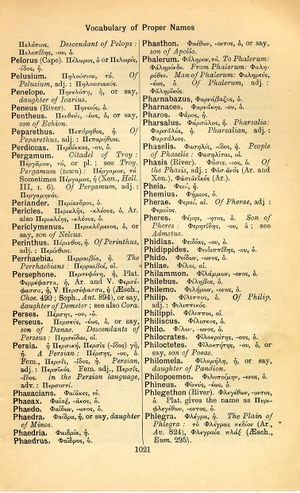Penelope
ὣς ὁ μὲν ἔνθ' ἀπόλωλεν, ἐπεὶ πίεν ἁλμυρὸν ὕδωρ → so there he perished, when he had drunk the salt water
English > Greek (Woodhouse)
Πηνελόπη, ἡ, or say, daughter of Icarius.
Latin > English (Lewis & Short)
Pēnĕlŏpē: ēs, and Pēnĕlŏpa, ae (Pēnĕlŏpēa, = Πηνελόπεια>, Auct. Priap. 68, 28), f., = Πηνελόπη,
I daughter of Icarius and Peribœa, wife of Ulysses, and mother of Telemachus, celebrated for her chastity and constancy, Ov. H. 1; Hyg. Fab. 126; Plaut. Stich. 1, 1, 1; Cic. N. D. 3, 22, 56; id. Ac. 2, 29, 65; Hor. C. 3, 10, 11; id. S. 2, 5, 76; Juv. 2, 56: sponsi Penelopae, for sensualists, Hor. Ep. 1, 2, 28.—
B Transf, poet., a chaste wife, Mart. 1, 63, 6.—Hence,
II Pē-nĕlŏpēus, a, um, adj., of or belonging to Penelope, Penelopean: Telemachus, i. e. the son of Penelope, Cat. 61, 231: fides, Ov. Tr. 5, 14, 36.—Subst.: Pēnĕlŏpēa = Penelope, Auct. Priap. 70, 20.

